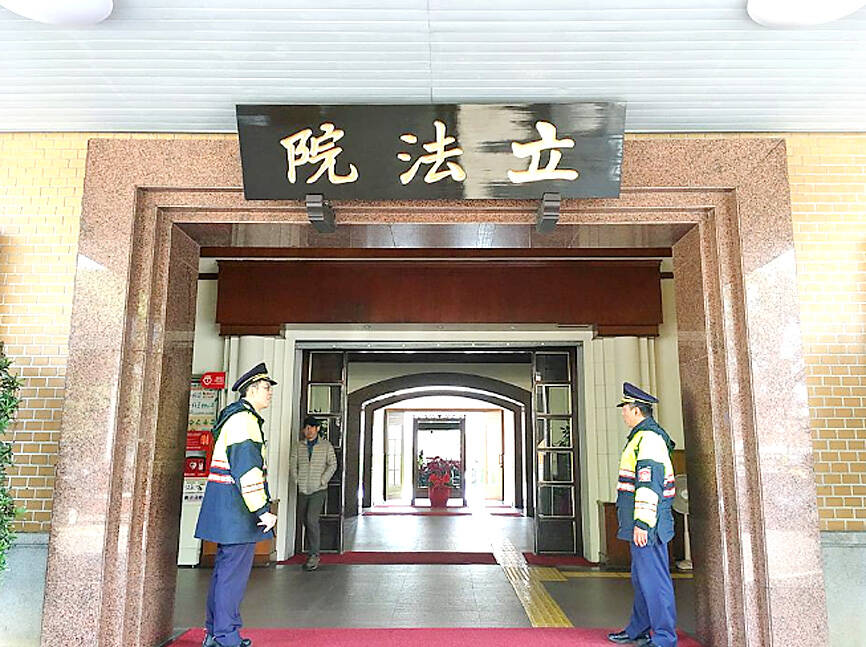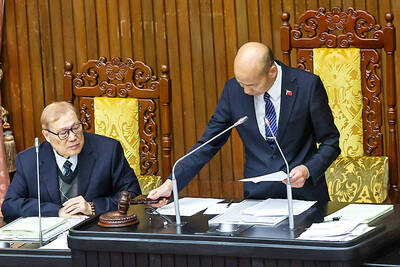Democratic Progressive Party (DPP) legislators have proposed a bill that would ban Chinese who obtain Taiwanese citizenship from running for office if they fail to produce documents showing that they have renounced their Chinese nationality.
DPP legislators Wang Ting-yu (王定宇) and Lin Ching-yi (林靜儀) proposed the bill to amend the Act Governing Relations Between the People of the Taiwan Area and the Mainland Area (兩岸人民關係條例) following media reports that the Taiwan People’s Party (TPP) considered nominating Xu Chunying (徐春鶯) — a Chinese immigrant who has lived in Taiwan for 30 years and obtained Republic of China citizenship through marriage 23 years ago — for its legislators-at-large list.
The reported nomination of Xu, who chairs the Taiwan New Residents’ Development Association, caused a public uproar, as she has allegedly voiced support for unification with Taiwan and allegedly has not yet renounced her Chinese nationality.

Photo: Lin Liang-sheng, Taipei Times
The proposed amendment was submitted to the legislature’s Internal Administration Committee for review on Friday.
Currently, the act only requires Chinese nationals who have Taiwanese identification cards to cancel their household registrations in China and be registered with a household in Taiwan for more than 10 years before they are allowed to run for public office, without having to renounce their Chinese nationality, Wang and Lin said in their bill.
However, the Nationality Act (國籍法) requires those serving in public offices to hold only Taiwanese nationality as they are obligated to demonstrate loyalty to the country.
“The Act Governing Relations Between the People of the Taiwan Area and the Mainland Area not only contravenes the constitutional principle of equality by treating Chinese and Taiwanese differently, it has reduced the loyalty requirement in the Nationality Act to an unenforceable law,” they said.
The legislators proposed that Chinese nationals with Taiwanese citizenship show proof that they have renounced their Chinese nationality before they are allowed to work in government or run for public office.
Wang and Lin also proposed an amendment to Article 16 of the Laws and Regulations Regarding Hong Kong and Macau Affairs (香港澳門關係條例) to require residents from the Chinese territories to show documents proving they have renounced their Chinese nationality before they can register as political candidates in Taiwan, form political parties and work in government, academic institutions and state-run business organizations.
The legislators said that Hong Kong and Macau have demonstrated major political, economic and social differences from Taiwan after returning to China’s governance.
Currently, residents from the territories who are permitted to enter Taiwan are allowed to register as candidates for public office, serve in the military and organize political parties if they have maintained a registered domicile in Taiwan for 10 years, while those who have entered Taiwan with permission must have a household registration for one full year before they can join the military, run for office or form political parties.
DPP Legislator Tang Hui-jane (湯蕙禎) also proposed an amendment to the Act Governing Relations Between the People of the Taiwan Area and the Mainland Area that would ban certain Chinese nationals from serving in the Taiwanese military or working in intelligence and defense agencies, including those who currently or previously worked for the Chinese government, Chinese news media or the Chinese Communist Party.

DEFENDING DEMOCRACY: Taiwan shares the same values as those that fought in WWII, and nations must unite to halt the expansion of a new authoritarian bloc, Lai said The government yesterday held a commemoration ceremony for Victory in Europe (V-E) Day, joining the rest of the world for the first time to mark the anniversary of the end of World War II in Europe. Taiwan honoring V-E Day signifies “our growing connections with the international community,” President William Lai (賴清德) said at a reception in Taipei on the 80th anniversary of V-E Day. One of the major lessons of World War II is that “authoritarianism and aggression lead only to slaughter, tragedy and greater inequality,” Lai said. Even more importantly, the war also taught people that “those who cherish peace cannot

STEADFAST FRIEND: The bills encourage increased Taiwan-US engagement and address China’s distortion of UN Resolution 2758 to isolate Taiwan internationally The Presidential Office yesterday thanked the US House of Representatives for unanimously passing two Taiwan-related bills highlighting its solid support for Taiwan’s democracy and global participation, and for deepening bilateral relations. One of the bills, the Taiwan Assurance Implementation Act, requires the US Department of State to periodically review its guidelines for engagement with Taiwan, and report to the US Congress on the guidelines and plans to lift self-imposed limitations on US-Taiwan engagement. The other bill is the Taiwan International Solidarity Act, which clarifies that UN Resolution 2758 does not address the issue of the representation of Taiwan or its people in

The Philippines yesterday criticized a “high-risk” maneuver by a Chinese vessel near the disputed Scarborough Shoal (Huangyan Island, 黃岩島) in a rare incident involving warships from the two navies. The Scarborough Shoal — a triangular chain of reefs and rocks in the contested South China Sea — has been a flash point between the countries since China seized it from the Philippines in 2012. Taiwan also claims the shoal. Monday’s encounter took place approximately 11.8 nautical miles (22km) southeast” of the Scarborough Shoal, the Philippine military said, during ongoing US-Philippine military exercises that Beijing has criticized as destabilizing. “The Chinese frigate BN 554 was

LEISURE: The new law adds Confucius’ birthday, the anniversary of the Battle of Guningtou, Constitution Day and Little New Year as national holidays The Legislative Yuan yesterday passed new legislation adding four national holidays and making Workers’ Day a national holiday for all sectors. The Chinese Nationalist Party (KMT) and the Taiwan People’s Party used their combined majority in the legislature to push the jointly proposed draft through its third and final reading. This new law supersedes the existing regulations for the implementation of memorial days and state holidays, which are administered by the Ministry of the Interior. The new law recognizes Confucius’ birthday on Sept. 28, the anniversary of the Battle of Guningtou on Oct. 25, Constitution Day on Dec. 25 and “Little New Year,”